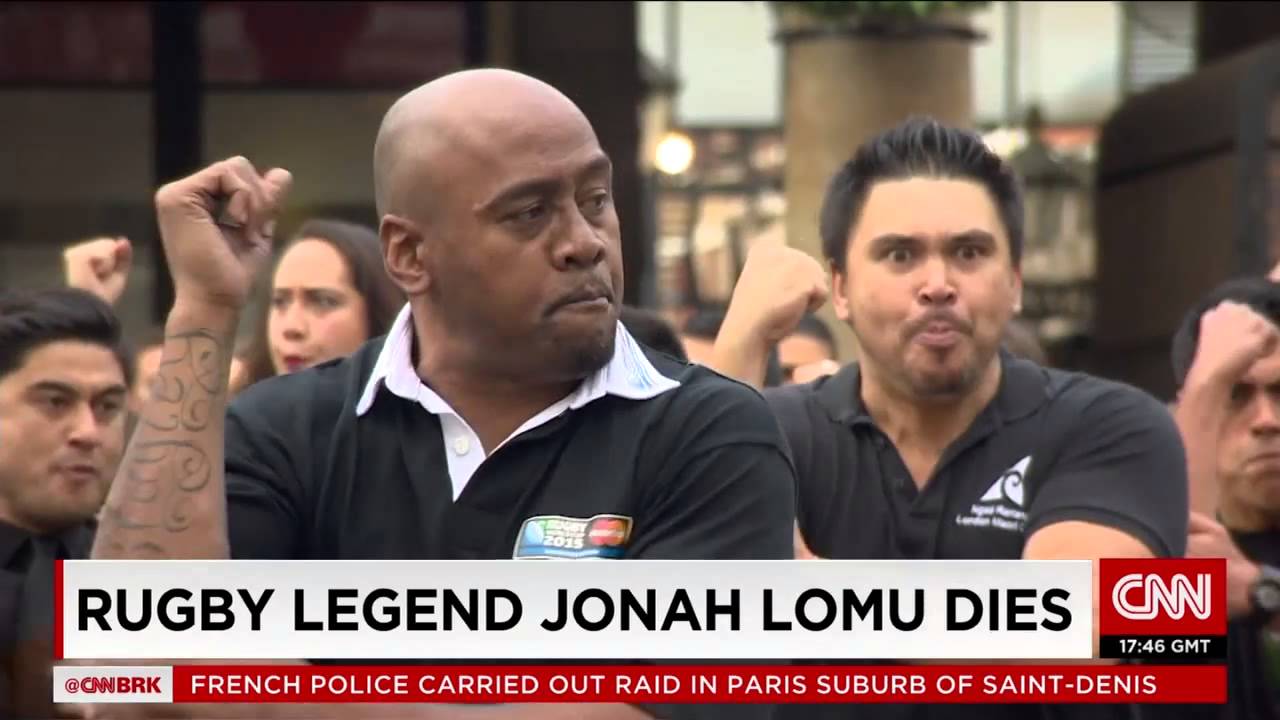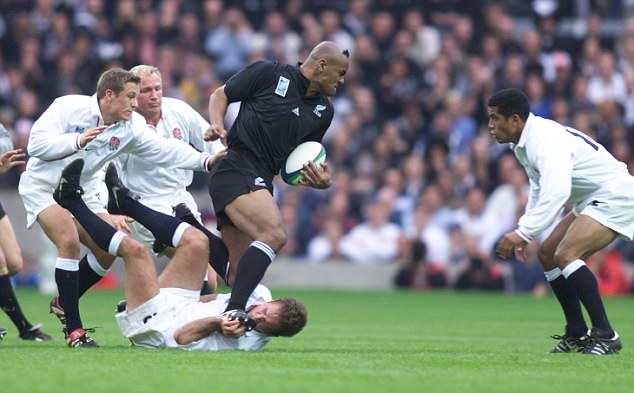2024. 7. 27. 06:59ㆍOceania-Others'
He was IMPOSSIBLE to stop! | Jonah Lomu
https://www.youtube.com/watch?v=nKoTGdIhO-U
On Jonah Lomu's anniversary we look back at the Rugby World Cup career of a legend. The All Blacks back was impossible to stop at times, here we countdown his 10 best tries from an illustrious career.
Jonah Lomu, All Blacks legend, dies aged 40
- Former All Blacks doctor confirms news on Wednesday morning
- ‘We’re all shocked and deeply saddened’, says New Zealand Rugby CEO
One of the finest rugby union players to have graced the game and a favourite son of New Zealand, Jonah Lomu, died unexpectedly overnight at the age of 40.
He had arrived back in Auckland from overseas on Tuesday.
The former All Blacks winger, whose imposing physique and often brutal running game provoked in opponents equal amounts of admiration and fear, had suffered from health problems since calling time on his playing career in 2002 due to a rare kidney disease, nephrotic syndrome. He underwent a kidney transplant in 2004 and had been on dialysis treatment for the past 10 years.
Details of the exact cause of his death remain unclear.
“The family are obviously devastated, as are friends and acquaintances,” John Mayhew, the former All Blacks doctor, said. “The family have requested privacy at this stage, they are obviously going through a terrible time. It was totally unexpected.”
Lomu had been at the recent Rugby World Cup in the UK where he had undertaken some promotional work for a tournament sponsor. He and his family holidayed in Dubai on their way back to New Zealand.
“We’re all shocked and deeply saddened at the sudden death of Jonah Lomu,” New Zealand Rugby chief executive Steve Tew said. “Jonah was a legend of our game and loved by his many fans both here and around the world. We’re lost for words and our heartfelt sympathies go out to Jonah’s family.”
Lomu, who was born in Auckland but spent his early years in Tonga, was not just one of the best sportsmen New Zealand has produced. The gentle giant’s tough upbringing in South Auckland nearly led him down a different path, but his determination to eschew a life of street violence made him a role model and inspiration to many young boys and girls of Pacific Island heritage who faced similar challenges at an early age.
In 2011 he travelled back to Tonga to promote the game before the Rugby World Cup. Tonga’s sports minister Fe’ao Vakata said of his impact there: “Certainly if other countries were proud of Jonah Lomu, then firstly Tonga would be much prouder.”
He had also been an ambassador for Unicef New Zealand since 2011, and a patron of the charity Kidney Kids NZ.
Reaction to his sudden death was overwhelming. New Zealand’s prime minister John Key was among those to express his condolences. “Deeply saddened to hear of Jonah Lomu’s unexpected passing this morning. The thoughts of the entire country are with his family,” he said.
Sir Graham Henry, who guided the All Blacks to World Cup success in 2011, said: “It’s just so sad, I saw him at the World Cup and he looked so well. It’s just a hell of a shock.”
Lomu played in 63 Tests for New Zealand after making his debut in 1994. He scored 37 tries, including one that arguably defined his career – a bullocking rampage through, not past, several England players at the 1995 World Cup. His effort was this year voted the greatest in World Cup history.
That edition of the World Cup propelled him into the international spotlight and his match-winning performances on the pitch in South Africa and humility off it were widely credited with bringing about the advent of the game’s professionalism a year later.
Lomu made his All Blacks debut at the age of 19 years and 45 days, against France in Christchurch in 1994, breaking a record that had stood for 90 years to become New Zealand’s youngest Test player.
He was taken to the World Cup a year later as something of a wildcard pick by coach Laurie Mains, a decision he would not regret.
Lomu scored seven tries in total – four during that semi-final win over England – as the All Blacks reached the final, where they eventually succumbed to the host nation.
Lomu’s rise to international prominence in South Africa not only made him a star of the game, but also helped take rugby union to a global audience it had previously been unable to reach.
“What it meant for rugby, that World Cup changed everything,” Lomu told the Guardian in August. “When I look at it now I understand my impact more. When they show clips of me on the TV, my sons turn and look at me.”
“They have grown up as the sons of Jonah and it’s a daunting task trying to explain to them what I achieved.
“I don’t have any regrets. Everything that I achieved in rugby I cherished. I was in a World Cup final in South Africa against South Africa when a country became one. As Francois Pienaar [the Springboks captain] said: ‘It was not 80,000 in the stadium, it was 44 million.’”
In total, Lomu scored 15 World Cup tries – a benchmark equalled by South Africa’s Bryan Habana at this year’s tournament – although 1995 was the closest he came to lifting the Webb Ellis Cup.

The Haʻapai Islands, Tonga, where Lomu's parents emigrated from and where he spent parts of his childhood.

Jonah Tali Lomu MNZM ( Birth name Jonah Tali Lomu, 12 May 1975 – 18 November 2015) was a New Zealand professional rugby union player. He is widely regarded as one of the greatest and most influential players in the history of the sport, and as one of the most talented sportsmen ever. Lomu is considered to have been the first true global superstar of rugby, and consequently had a huge impact on the game.
Standing 6 feet 4 inches (1.93 m) and weighing 119 kilograms (262 lb), Lomu was famed for his unprecedented speed, strength and agility. Exceptionally large for a wing player, he is also known as the first winger to be a physical heavyweight. For his fast and effortless style of play, Lomu was once nicknamed the "freight train in ballet shoes", and was celebrated for his ability to shrug off tackles from multiple opponents at once. He became the youngest ever All Black when he played his first international in 1994 at the age of 19 years and 45 days. Playing on the wing, Lomu finished his international career with 63 caps and 37 tries. Lomu was inducted into the International Rugby Hall of Fame on 9 October 2007, and the IRB Hall of Fame on 24 October 2011.
In 1995 he was diagnosed with nephrotic syndrome, a serious genetic kidney disorder, and the disease had a significant impact on his playing career and wider life. By 2003 he was on dialysis, and in 2004 underwent a kidney transplant that saved his life.
After a period of hiatus, he returned to play domestically rather than internationally. Lomu played for several domestic New Zealand provincial or Super Rugby sides, and late in his career played club rugby in both Wales and France. These included the Auckland Blues, with whom he won the inaugural 1996 Super 12 Final with, Chiefs and Hurricanes, and Counties Manukau, Wellington, and later North Harbour and the Cardiff Blues. His illness forced his retirement from professional rugby in 2007 at the age of 32.
After returning from abroad, Lomu died unexpectedly on 18 November 2015 at home in Auckland.
Date of death : 18 November 2015 (aged 40)
The cause was a heart attack associated with his kidney condition. His passing saw widespread tributes to him and his family, from Queen Elizabeth II to a haka performed by the pupils of his boyhood primary school. The New Zealand Parliament passed a national motion in honour of his life.

Jonah Lomu (born 12 May 1975, died 18 November 2015) was the first – and remains the only – rugby player to achieve worldwide fame. His feats at the 1995 Rugby World Cup tournament made him a household name, ensured the success of the transition to professional rugby, and redefined wing play.
Jonah Tali Lomu was born to Tongan parents in south Auckland, which he called home for much of his life. Aged 12, he could pass for 18. Blessed with speed as well as size, he starred at athletics and excelled at rugby at Wesley College. As a lock and then a loose forward, he intimidated schoolboy opponents and was soon a New Zealand age-group representative.

Lomu’s impressive play at the 1994 Hong Kong Sevens tournament encouraged All Blacks coach Laurie Mains to select him on the left wing for the mid-year series against France. Recently turned 19, he was the youngest All Black ever – and played like it. Raw potential could not make up for positional naivety and nervous ball-handling. Lomu was among those left grasping at shadows as the French scored the ‘try from the end of the world’ that won the second test at Eden Park.
'Oceania-Others'' 카테고리의 다른 글
| Queen Elizabeth death sparks memories of meetings with the All Blacks (0) | 2024.07.27 |
|---|---|
| Jonah Lomu: The Queen sends message of condolence (0) | 2024.07.27 |
| Unforgettable Rugby Star, Jonah Romu (1) | 2024.07.27 |
| Hayley Westenra - Gabriel's Oboe (Whispers In A Dream);Nella (0) | 2024.07.27 |
| Pokarekare ana, Korean Love song (0) | 2024.07.27 |


